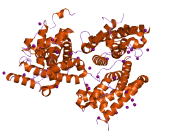You have reached the HIVandHepatitis.com legacy site. Please visit our new site at hivandhepatitis.com
| HIV
and Hepatitis.com Coverage of the
61st Annual Meeting of the American Association for the Study of Liver Diseases (AASLD 2010) October 29 - November 2, 2010, Boston, MA |
|
|||||||||||||||||||
|
Are
IL28B Gene Variations Associated with Outcomes in People with Hepatitis
B?
 In
2009, researchers
first reported that specific variations known as single nucleotide
polymorphisms (SNPs) in the IL28B gene region -- which encodes interleukin
28, also known as interferon lambda -- were associated with spontaneous
clearance of genotype 1 hepatitis C virus (HCV) and response to interferon-based
therapy for chronic infection. Different teams have identified several
associated SNPs, but one known as rs12979860 is implicated most often. In
2009, researchers
first reported that specific variations known as single nucleotide
polymorphisms (SNPs) in the IL28B gene region -- which encodes interleukin
28, also known as interferon lambda -- were associated with spontaneous
clearance of genotype 1 hepatitis C virus (HCV) and response to interferon-based
therapy for chronic infection. Different teams have identified several
associated SNPs, but one known as rs12979860 is implicated most often.
Each individual carries 2 copies of the relevant gene on chromosome 19. Among people with hepatitis C, individuals with the C/C gene pattern -- meaning they carry 2 copies of the "C" variant, or allele -- are more likely to respond well to interferon alfa plus ribavirin. People with the T/T pattern have the least favorable response, while those carrying 1 "C" and 1 "T" allele fall somewhere in between. Hepatitis B Treatment Response In the first study presented at the AASLD meeting, Bart Takkenberg and Hendrik Reesink from the University of Amsterdam investigated whether the rs12979860 SNP linked to hepatitis C outcomes is also associated with outcomes among patients with chronic hepatitis B virus (HBV) infection treated with a combination of pegylated interferon plus adefovir (Hepsera). The investigators determined IL28B gene patterns for 96 chronic hepatitis B patients -- 45 hepatitis B "e" antigen (HBeAg) positive and 51 HBeAg negative -- with HBV DNA viral load > 20,000 IU/mL at baseline who were treated with pegylated interferon alfa-2a (Pegasys) plus adefovir for 48 weeks, followed by a 24-week post-treatment follow-up period. The researchers saw no significant association between rs12979860 SNP pattern and viral load or hepatitis B surface antigen (HBsAg) status at baseline. Among patients who completed treatment, there were also no significant differences in overall outcomes between the different rs12979860 groups. There was a trend toward a greater likelihood of sustained virological response (SVR, defined as HBV DNA < 2000 IU/mL) among HBeAg negative patients with the favorable C/C pattern (57%) compared to those with C/T or T/T (36% combined). In contrast, HBeAg seroconversion among initially HBeAg positive patients was somewhat less common in the C/C group (22% vs 54%, respectively). Rates of HBsAg loss were similar. Finding significant links between IL28B gene patterns and treatment outcomes might require larger studies, the researchers suggested, "as the heterogeneity of HBV patients, viral genotypes, and definitions of outcome make [hepatitis B] more challenging for evaluation of host genetics" than hepatitis C. HBV Genotype D In the second study, Pietro Lampertico from Universita degli Studi di Milano in Italy and colleagues looked at the association between the same rs12979860 SNP and outcomes among 101 HBeAg negative chronic hepatitis B patients. Most (92%) had HBV genotype D and about half had liver cirrhosis. Just under half (48) had the C/C pattern, 42 had C/T, and 11 had T/T. Participants were treated with either conventional or pegylated interferon alfa for 12-24 weeks, and followed for 11 years on average post-treatment. During follow-up 21% experienced HBsAg clearance and 15% achieved HBs antibody response. Here, HBsAg clearance rates differed significantly across IL28B patterns: 36% of T/T patients, 29% of C/C patients, and just 7% of C/T patients. In a univariate analysis, baseline HBV DNA, ALT level, and IL28B pattern were significantly associated with HBsAg clearance, but not patient age, sex, cirrhosis, or HBV genotype. In a multivariate analysis, baseline HBV DNA < 6 log copies/mL, ALT > 150 IU/mL, and the rs12979860 C/C pattern (odds ratio 3.9; P = 0.025) remained significant predictors. "IL28B
polymorphism may represent an additional pretreatment predictor of interferon
response in HBeAg negative, genotype D patients with chronic hepatitis
B," the researchers concluded. 11/12/10 References B Takkenberg, A de Niet, R Benayed, H Reesink, and others. Association between treatment outcome and rs12979860 polymorphism in HBeAg positive and negative chronic hepatitis B patients treated with Peginterferon alfa-2a (Pegasys) and Adefovir (Hepsera); An interim analysis. 61st Annual Meeting of the American Association for the Study of Liver Diseases (AASLD 2010). Boston, October 29-November 2, 2010. Abstract LB-21. P Lampertico, M Vigano, C Cheroni, and others. Genetic variation in IL28B polymorphism may predict HBsAg clearance in genotype D, HBeAg negative patients treated with interferon alfa. 61st Annual Meeting of the American Association for the Study of Liver Diseases (AASLD 2010). Boston, October 29-November 2, 2010. Abstract 237. F Kurbanov,
MP Martin, Y Qi, CL Thio, and others. An IL28B SNP that is associated
with HCV outcome is not associated with HBV or HIV outcome. 61st Annual
Meeting of the American Association for the Study of Liver Diseases
(AASLD 2010). Boston, October 29-November 2, 2010. Abstract
1408. |
|
|||||||||||||||||||